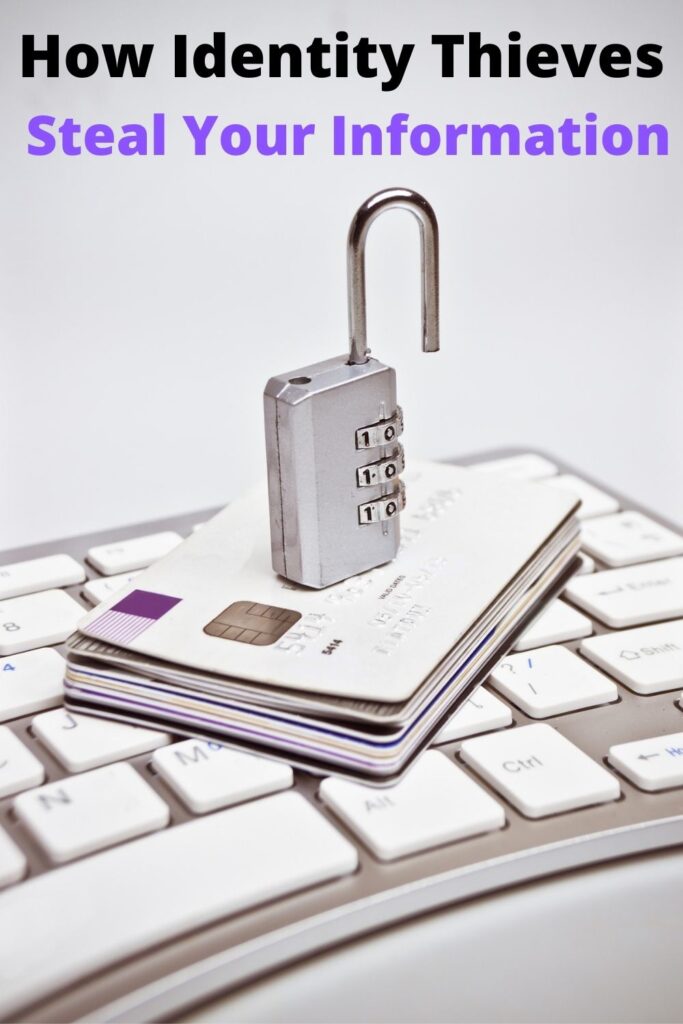Last Updated on January 24, 2022 by Diane Hoffmaster
This post about how identity thieves steal your information is sponsored by Sivan Social. All comments and opinions are my own.
Identity theft is a serious crime that can have a lasting impact on your life.
Every year, millions of people fall victim to identity theft. This crime can result in stolen money, ruined credit, and even criminal charges.
Learning how identity thieves get your information is the first step in protecting yourself from this crime. There are many ways to protect yourself, including using strong passwords, shredding sensitive documents, and monitoring your credit reports. If you are a victim of identity theft, take action immediately to minimize the damage.
Table of Contents
January 24th - 28th is Data Privacy Week
Data Privacy Week is an international effort to create awareness about digital data privacy. Many people are unaware of how their personal information is being used, collected or shared online.
The goal of this week is to raise awareness about online privacy and educate individuals on protecting their personal information. Because the more of your personal information that you relinquish online, the easier it is for thieves to steal it.
This week, take stock of your personal cybersecurity and take steps to be more secure online. Keep reading for information on how to protect your personal data or check out the Best Identity Theft Protection Services page on Security.org
My personal identity theft story
The first time I was the victim of identity theft was 20 years ago. The internet was barely even a thing back then. But, someone opened a checking account in my name, with an address I hadn't lived at for three years.
From what I could piece together, it wasn't a data breach or phishing attack or any other 'modern' method of identity theft. My old bank discarded my personal information in a trash can and someone went dumpster diving.
I lived halfway across the country. I had to file a police report, call and request credit reports (yes, actual phone calls), and talk to my credit card company. Basically, I lived ankle-deep in paperwork and phone calls for months. It was a giant hassle. And I can honestly say that I have become very, VERY protective of my online privacy as a result of this experience.
Since this first experience, my husband and I have both had our identities stolen at least once in the last 10 years.
From credit card numbers being stolen online to someone stealing my husband's social security number, it has created a lot of problems. As a result, we have taken a number of steps to protect ourselves online and offline.
How identity thieves get your information
There are many different ways for identity thieves to get your information. Unfortunately, the methods of these criminals change frequently. In general, there are three main ways that identity thieves get your information:
1. They physically steal it from you: Identity thieves can find personal information in a number of places. You'd be amazed at how long it takes some people to realize there is a credit card missing from their wallet.
2. They obtain it by stealing your mail: Identity thieves can get important personal information from your mailbox, including credit card offers and tax-related documents.
3. They steal it while you are online: Sometimes, identity thieves can obtain information about you by stealing it directly from your computer, phone, or tablet.
Every year, millions of people fall victim to identity theft. This crime can result in stolen money and ruined credit if important personal information like bank account numbers and social security numbers are stolen. If you learn how identity thieves get your information, you can keep yourself safe.
Protecting your personally identifiable information
You would be amazed at how quickly an unscrupulous person can piece together your life by the bits and pieces of information you leave unprotected. From bank statements to your social security number, protect these bits of sensitive information as much as possible.
1. What is personally identifiable information (PII)?
PII can be anything that can identify or distinguish one individual from another. Whether it is your medical record number accessed through a data breach at your insurance company or blank checks stolen out of your mailbox, PII is everywhere nowadays.
2. Why is it important to protect your PII?
How does identity theft happen? When criminals gain access to your PII, they can open up all types of new accounts in your name.
Not only can this damage your credit score, but it is also difficult to track down all the different sources where they may have applied for credit with various fraudulent documents.
Some crimes go undetected. Some victims are burdened with criminal charges. All because someone else assumed their identity.
3. How can you protect your PII online
Identity theft can happen in many different ways. Because of this, there are several ways you can protect your PII online.
-Never click on random links in emails. They may be phishing attacks, where an identity thief is sending malicious links to attempt to swipe personal information.
-Avoid using public WI FI networks when at cafes or airports. And especially, NEVER conduct financial transactions on public Wi Fi.
-Only use secure websites that begin with "https://". It's a small lock icon in your browser that indicates that the site is secure. This will help protect your credit card number while shopping online.
-Don't send sensitive information via text messages. Private information is just that. Private. And text messages are not. Unless you want your social security number to end up on the dark web, don't text it to anyone. Don't text your teenager your pin number or send a credit card number to a family member via text message.
3. How can you protect your PII offline
Your personal information is at risk, even when you are not actually using a digital device.
-Be careful when sharing personal information with others.
-Do not leave documents in a car or in an open purse or wallet, especially credit card statements and your social security number.
-Shred all old bills and pay stubs. Throwing out your medical insurance information, utility bills, or bank statements might seem harmless. However, many people are the victims of identity theft because a criminal went dumpster diving. That stolen information ends up on the dark web. Paired with other stolen information like your birth date or which financial institutions you use and in one fell swoop you have made it easy for someone to commit identity theft.
-Monitor your bank account statements regularly.
-Be suspicious of phone calls. If your caller ID doesn't recognize a phone number, don't trust that the caller is who they say they are. If someone calls stating they are from one of your credit card companies, hang up and call the company directly. Definitely don't give personal information to anyone who calls you directly.
-Check your credit report at least once yearly. Credit bureaus will help you monitor credit card accounts and can help you place a security freeze on your social security number if necessary. Ask them how to get a free credit report every year.
What to do if your identity is stolen
If you are a victim of identity theft, take action immediately to minimize the damage. It's not just a minor annoyance. It is a HUGE hassle when thieves steal your personal or financial information.
- Call the police. This is not always required, but they can help you to build a case if you are targeted.
- Contact your credit or debit card companies and each financial institution with your new information ASAP. Request that they open fraud cases for each account opened with your identity. It will take time to straighten out identity fraud, but you need to act quickly.
- Place a security freeze on your credit report. This will stop anyone trying to open new accounts in your name. Your credit score might take a hit during this time, but it's better than having someone steal your identity for months before it is detected.
If you have been a victim of identity theft, get started on the process to clear your name as soon as possible. That means contacting all three credit bureaus to start disputing incorrect information that may still be on your report.
With criminals constantly finding new ways to steal personal and financial information, it is important that you stay aware of your surroundings and constantly monitor your existing accounts. While it might feel tedious, the only way to stop identity theft is to stay on top of your credit report and financial statements.
Data Breaches and Free Credit Monitoring
Many data breaches have made the news in the last few years. If you work for a well-known company that gets hacked, your private information may become public.
Your place of work may have its company information hacked including your employment records.
A place you shop at may have a card reader hacked that skims your credit card information.
If this happens, companies will often sign you up for a service that provides one free credit report and identity theft monitoring for the next year or two. Take advantage of every single credit report offered through this service.
ID Theft Resources
Want more in-depth information about protecting your private information and how identity theft victims handle the hassle of a computer security breach?
Visit the Identity Theft Protection Guide on Security.org to read more about the following topics:
- What Is Identity Theft?
- Statistics
- How it Happens
- Potential Victims
- Impact
- Prevention
- Buying Guide
- Recovery
Protecting yourself from identity theft is your responsibility, but it doesn’t have to be difficult. You can take simple steps like using strong passwords and shredding sensitive documents. Cybercriminals will always find new ways to steal data, so make sure that you stay up-to-date on all security news in order to keep your information safe online. Have you taken any measures yet today? What tips do you recommend for protecting yourself against identity thieves? Share with us below!
Like these identity theft protection tips? Read these financial posts as well:
- Creating a financial wellness checklist: It's a great way to pay off student loans, tackle credit card debt, boost retirement savings and create an emergency savings account.
- What to look for in a financial advisor: As with hiring any professional, you need to find someone you can trust.
- Examples of personal finance goals to work towards. Here are a few things I have put on my financial to-do list in the next few months.

Diane is a professional blogger and nationally certified pharmacy technician at Good Pill Pharmacy. She has two college aged kids, one husband and more pets than she will admit to. She earned her BS in Microbiology at the University of New Hampshire but left her career in science to become a stay at home mom. Years of playing with LEGO and coloring with crayons had her craving a more grown up purpose to her life and she began blogging and freelance writing full time. You can learn more about her HERE.









Leave a Reply